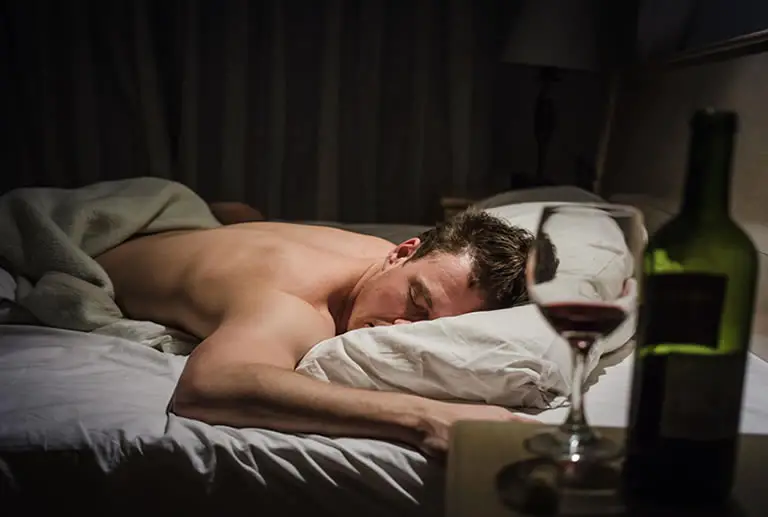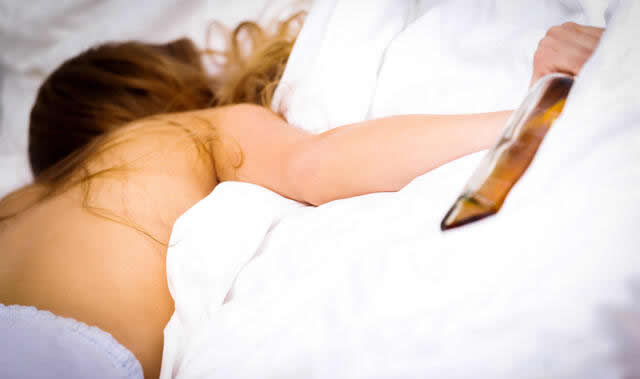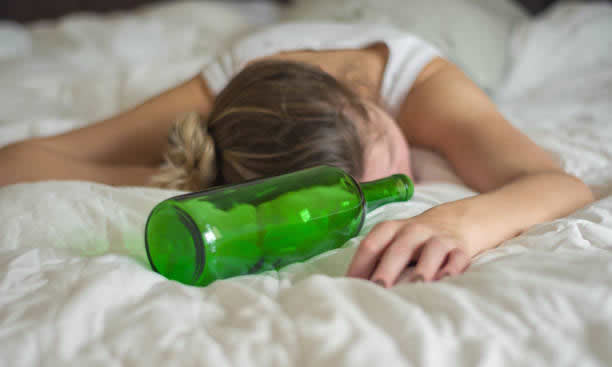
It is very common for some people to use alcoholic beverages as an aid to help them sleep better. There is evidence to suggest that drinking right before bed time can cause some very vivid dreams. But what about controlled dreaming, can you lucid dream while drunk?
Contents
- The Truth About Alcohol and Lucid Dreaming
- Alcohol and vivid dreams
- Can you lucid dream while drunk or must you be sober?
- How alcohol affects sleep quality
- Does alcohol cause lucid dreams or vivid dreams?
- Drinking and lucid dreams. Why becoming lucid while drunk is a waste of time
- Are there any lucid dreaming benefits to drinking alcohol?
- Can you get drunk in a lucid dream?
The Truth About Alcohol and Lucid Dreaming
Can you lucid dream while drunk?
It is possible to lucid dream while drunk but it is very rare.
Alcohol suppresses REM sleep which reduces the likelihood of experiencing lucid dreams.
If you do experience a lucid dream you will remain drunk in the dream with all the same limitations on consciousness you would experience while awake and intoxicated.
You are also unlikely to remember the dream.
Alcohol and vivid dreams
There is a lot of circumstantial evidence to suggest that drinking alcohol before sleep can cause you to experience some very vivid and weird dreams.
Having weird and vivid dreams is a great step to becoming lucid.

Vivid and weird dreams act as a catalyst for becoming lucid because they often make the dreamer realize that, what they are experiencing could not possibly be real.
This realization, of the impossibility of what is happening, it usually enough for the dreamer to conclude that they must be dreaming (the cause for most lucid dreams).
As alcohol causes such vivid and weird dreams you would expect it to be beneficial for lucid dreams.
However, the exact opposite is the case.
It is much more common to have vivid dreams after consuming alcohol than it is to have lucid dreams.
Drinking alcohol before bed will also increase the likelihood of experiencing vivid nightmares though.
So, why you are more likely to experience vivid non-lucid dreams and less likely to have lucid dreams when drunk is covered below.
Can you lucid dream while drunk or must you be sober?
In order to understand why drinking alcohol before sleep can negatively affect your ability to have lucid dreams we need to delve a little bit into the science of sleep.
When we sleep over a prolonged period we go through several sleep cycles.
Each sleep sleep lasts about 2 hours and involves 4 different stages of sleep.
The 4 stages of sleep are:
Stage 1 – Hazy twilight sleep. Here you drift from conscious awareness to unconsciousness.
Stage 2 – Light sleep.
Stage 3 – Deep sleep. Restorative sleep when the body repairs itself.
Stage 4 – R.E.M. sleep. In this stage you experience rapid eye movement and can have lucid dreams.
As we pass through each of the sleep cycles from 1 – 3 we go deeper into sleep until we reach stage 4 where rapid eye movement (REM) occurs. Once we move out of REM, and finish dreaming, we wake up before falling back to sleep to start a new cycle.
Everyone does this, we just tend to forget that we have woken up several times in the night because in most cases will fall back asleep very quickly.
Once the 4 stages of sleep have been completed you have just finished 1 sleep cycle. We then go through the 4 stages again to complete another cycle. It is possible to complete 3 – 4 cycles per night, usually dependent on how long you sleep.
Although we can dream in non-REM sleep, it is only in REM sleep that lucid dreaming occur. I have highlighted many times on this website that lucid dreams occur during the REM stages of sleep.
As we have several REM cycles in every prolonged sleep period, of say 8 hours, it is possible to lucid dream multiple times in the same night, though this is not that common and not even advised.
Some people believe that it is not even possible to lucid dream every night let alone turn every dream we have into a lucid dream.
How does this relate to alcohol and lucid dreaming? Well, alcohol greatly inhibits the amount of REM sleep we experience.
Alcohol suppresses REM sleep thus reducing the number of opportunities to become lucid.
So on a very basic and fundamental level the mechanics of lucid dreaming are negatively affected by the consumption of alcohol.

You simply do not have the same number of opportunities to become lucid while you sleep in a drunk state than you do when you are sober.
But, having less opportunities to become lucid isn’t the only negative effect that alcohol has on your sleep.
Drinking alcohol before bed may cause very vivid nightmares while simultaneously restricting your ability to lucid dream but these aren’t the only drawbacks of going to bed drunk.
Alcohol also has some more serious unwanted effects, especially on your quality of sleep.
How alcohol affects sleep quality
Alcohol can be very disruptive to sleep.
As we have seen, alcohol suppresses REM sleep and those disrupts the natural sleep cycle. This sleep cycle happens for very good reasons.
Bodily repair for instance occurs at the deepest levels of sleep while the brain is washed clean with cerebrospinal fluid.
These pulse-like cleansings of the brain usually occur while the sleeper is dreaming.
So, obviously disrupting the stages and cycles of sleep has a knock-on effect, disrupting the extremely beneficial actions that occur during each stage which thus has a very negative effect on mind and body.
It should come as no surprise therefore that it is not uncommon to wake from an alcohol fueled sleep, even a very long one, feeling very tired and disoriented.
Does alcohol cause lucid dreams or vivid dreams?
Many would-be lucid dreamers look for shortcuts, or fast tracks, to achieving lucid dreams.
As we’ve already seen consuming alcohol before sleep can cause some very vivid dreams so it seems logical to assume that it might also cause lucid dreams.
Alcohol cannot cause lucid dreams. In fact, alcohol inhibits our ability to lucid dream because it suppresses REM sleep, the state in which lucid dreams occur. There are, however, supplements that can cause lucid dreaming such as specific herbs.
Using alcohol as an aid to lucid dreaming is not really a very smart move.
As I outlined above alcohol can dramatically affect your sleep quality is some very negative ways and greatly diminish your ability to become lucid in your dreams.
Additionally, alcohol tends to promote vivid uncontrolled dreaming and increase the amount of nightmares you have.
There are much better supplements you can take to help you lucid dream such as sleep herbs and lucid dreaming pills.
Drinking and lucid dreams. Why becoming lucid while drunk is a waste of time
If you do find yourself becoming lucid in a dream, when you went to sleep drunk, you will find that you wake up in the dreamworld just as drunk as you were when you went to sleep.
Going lucid in a dream does not mean you become sober in the dream.
As your brain is being affected by the alcohol in your bloodstream the effects of drunkenness on your consciousness, that are common and all too well known, remain the same whether you are awake or asleep.
When you become lucid you are still being affected by the alcohol you drank and will therefore remain drunk in your dream.
Being drunk while awake has some negative effects on your motor skills and your mental processing abilities.
Likewise, when you become lucid in a dream while drunk these limitations are still evident and you will find it very difficult to control your dream the way you would if you were sober.
On a side note, alcohol always impairs memory and recall.
Even if you are exceptionally lucky and have a fully controlled lucid dream while drunk, you are unlikely to remember it after you waken!
Are there any lucid dreaming benefits to drinking alcohol?
As we have already seen, drinking alcohol before sleep will result in less REM stages of sleep. This means less chances to become lucid, as lucid dreaming only occurs during REM.
However, this imbalance in the sleep stages does have one beneficial effect for lucid dreamers. It is known as REM Rebound.
REM rebound refers to the phenomenon that occurs due to REM deprivation.
As you sleep under the influence of alcohol (though it can be caused by a number of other things also) you will experience REM deprivation, because the alcohol in your bloodstream suppresses REM sleep.
Once most of the alcohol has left your system – when you wake the next day sober – if you fall back to sleep, or go for a nap some time later, your brain will attempt to address the imbalance by giving you a longer period of REM sleep.
What advantage does this have for lucid dreamers?
Well, it means you can have a much longer lucid dream. Your REM rebound dream will likely be longer than any other dream you experienced before.
You get to play in the dreamworld much longer and usually in an environment that is more vibrant and vivid that usual.
Now, REM rebound will not cause you to have a lucid dream nor will it help you to become lucid in any way, it merely lengthens your dream.
However, you will reach REM much quicker than you normally would as you progress through the first 3 stages of sleep faster, in order to get to REM to address the imbalance caused in your earlier sleep.
And, as I stated already, the dream will be much longer.
Does this small benefit outweigh the drawbacks to drinking before you go to bed? No!
If you want to be an efficient lucid dreamer don’t use alcohol as an aid for sleeping.
Some lucid dreamers will use REM rebound to experience exceptionally long and vivid lucid dreams though they will always use a cleaner and safer method for doing this.
Can you get drunk in a lucid dream?
Ok so we have learned that drinking alcohol and lucid dreaming don’t really mix that well. Instead of aiding us to become lucid in our dreams alcohol inhibits our ability to lucid dream.
But what about going to bed sober and getting drunk in a lucid dream, is that possible?
You can get drunk in a lucid dream even if you were sober going to sleep. In a controlled lucid dream you can do anything you want and that includes getting drunk.
My very first lucid dream was an uncontrolled lucid dream (yes they do exist read this article to learn more about this type of lucid dream and the steps you can take to put them under your control.)
The reason why this lucid dream was uncontrolled was because I became lucid in a dream in which I was drunk!
Here is how it happened.
I was 21 years old and I had decided to have a nap on an extremely hot summer’s day that was unusually warm for Ireland.

The heat of the day had sapped my energy and so at about 2pm I decided to lie down on my bed and have a 30 minute sleep. I should note here that I was completely sober at the time.
After I feel asleep I literally fell into my dream. I was in a friend’s house and fell back onto a couch while holding a glass of beer. I thought this was strange as I couldn’t remember how I got there.
Looking out the window I noticed that it was dark outside. I thought to myself “how did it get dark, it is not even evening yet and it’s summer?”.
I suddenly realized that I should be back on top of my own bed at home in broad daylight I must, therefore, be dreaming.
At that instant I became lucid and fully conscious in the dream.
I immediately tried to get up from the couch so I could start investigating my dreamworld and try to exert some control over it.
Unfortunately though, I found that every time I tried to get up I just fell back onto the couch again.
It seems that I was completely and extremely intoxicated within the dream and could therefore not even control my own movements properly let alone take control over the dreamworld.
If I had, back then, the lucid dreaming experience that I have now, I would have been able to take the appropriate steps to sober myself up in the dream (because I was only “dream drunk”).
Then I could have taken control over it but back then I was inexperienced and just ended up waking myself from the lucid dream.
To avoid these type of early mistakes from happening to you, you should consider getting a good lucid dreaming course.
Talking to other experienced lucid dreamers via Reddit or a similar platform can also be helpful.
Joining a community and getting proper advanced lucid dreaming training can really accelerate your results and give you the type of omnipotent power over the dreamworld that makes lucid dreaming so awesome, fun and beneficial.
Once trained you can do anything you want to do in a lucid dream. You can even use your lucid dreams to affect reality – I kid you not!
